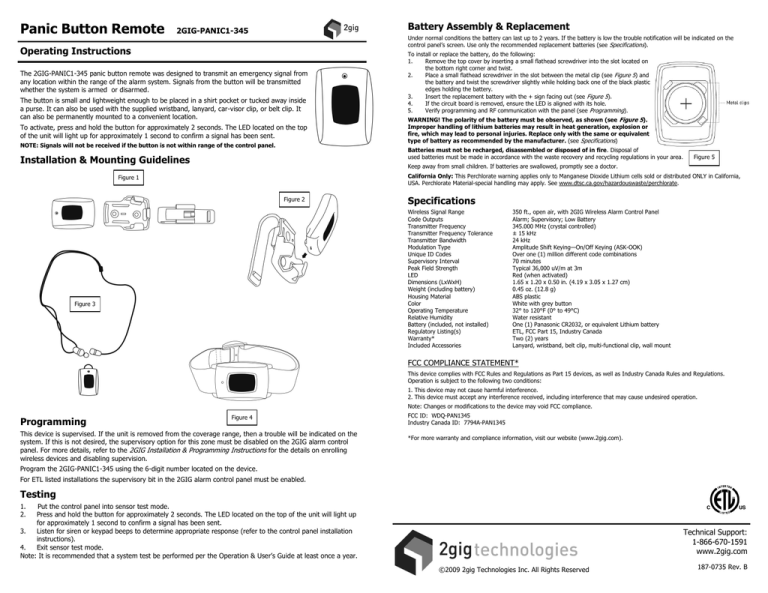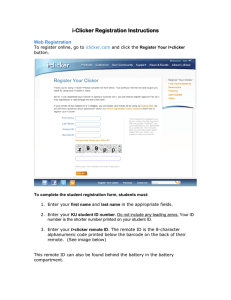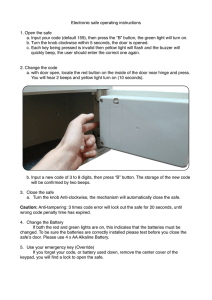
Panic Button Remote
Battery Assembly & Replacement
2GIG-PANIC1-345
Under normal conditions the battery can last up to 2 years. If the battery is low the trouble notification will be indicated on the
control panel’s screen. Use only the recommended replacement batteries (see Specifications).
Operating Instructions
The 2GIG-PANIC1-345 panic button remote was designed to transmit an emergency signal from
any location within the range of the alarm system. Signals from the button will be transmitted
whether the system is armed or disarmed.
The button is small and lightweight enough to be placed in a shirt pocket or tucked away inside
a purse. It can also be used with the supplied wristband, lanyard, car-visor clip, or belt clip. It
can also be permanently mounted to a convenient location.
To activate, press and hold the button for approximately 2 seconds. The LED located on the top
of the unit will light up for approximately 1 second to confirm a signal has been sent.
NOTE: Signals will not be received if the button is not within range of the control panel.
To install or replace the battery, do the following:
1.
Remove the top cover by inserting a small flathead screwdriver into the slot located on
the bottom right corner and twist.
2.
Place a small flathead screwdriver in the slot between the metal clip (see Figure 5) and
the battery and twist the screwdriver slightly while holding back one of the black plastic
edges holding the battery.
3.
Insert the replacement battery with the + sign facing out (see Figure 5).
4.
If the circuit board is removed, ensure the LED is aligned with its hole.
5.
Verify programming and RF communication with the panel (see Programming).
WARNING! The polarity of the battery must be observed, as shown (see Figure 5).
Improper handling of lithium batteries may result in heat generation, explosion or
fire, which may lead to personal injuries. Replace only with the same or equivalent
type of battery as recommended by the manufacturer. (see Specifications)
Batteries must not be recharged, disassembled or disposed of in fire. Disposal of
used batteries must be made in accordance with the waste recovery and recycling regulations in your area.
Installation & Mounting Guidelines
Figure 5
Keep away from small children. If batteries are swallowed, promptly see a doctor.
California Only: This Perchlorate warning applies only to Manganese Dioxide Lithium cells sold or distributed ONLY in California,
USA. Perchlorate Material-special handling may apply. See www.dtsc.ca.gov/hazardouswaste/perchlorate.
Figure 1
Figure 2
Specifications
Wireless Signal Range
Code Outputs
Transmitter Frequency
Transmitter Frequency Tolerance
Transmitter Bandwidth
Modulation Type
Unique ID Codes
Supervisory Interval
Peak Field Strength
LED
Dimensions (LxWxH)
Weight (including battery)
Housing Material
Color
Operating Temperature
Relative Humidity
Battery (included, not installed)
Regulatory Listing(s)
Warranty*
Included Accessories
Figure 3
350 ft., open air, with 2GIG Wireless Alarm Control Panel
Alarm; Supervisory; Low Battery
345.000 MHz (crystal controlled)
± 15 kHz
24 kHz
Amplitude Shift Keying—On/Off Keying (ASK-OOK)
Over one (1) million different code combinations
70 minutes
Typical 36,000 uV/m at 3m
Red (when activated)
1.65 x 1.20 x 0.50 in. (4.19 x 3.05 x 1.27 cm)
0.45 oz. (12.8 g)
ABS plastic
White with grey button
32° to 120°F (0° to 49°C)
Water resistant
One (1) Panasonic CR2032, or equivalent Lithium battery
ETL, FCC Part 15, Industry Canada
Two (2) years
Lanyard, wristband, belt clip, multi-functional clip, wall mount
FCC COMPLIANCE STATEMENT*
This device complies with FCC Rules and Regulations as Part 15 devices, as well as Industry Canada Rules and Regulations.
Operation is subject to the following two conditions:
1. This device may not cause harmful interference.
2. This device must accept any interference received, including interference that may cause undesired operation.
Note: Changes or modifications to the device may void FCC compliance.
Programming
Figure 4
This device is supervised. If the unit is removed from the coverage range, then a trouble will be indicated on the
system. If this is not desired, the supervisory option for this zone must be disabled on the 2GIG alarm control
panel. For more details, refer to the 2GIG Installation & Programming Instructions for the details on enrolling
wireless devices and disabling supervision.
FCC ID: WDQ-PAN1345
Industry Canada ID: 7794A-PAN1345
*For more warranty and compliance information, visit our website (www.2gig.com).
Program the 2GIG-PANIC1-345 using the 6-digit number located on the device.
For ETL listed installations the supervisory bit in the 2GIG alarm control panel must be enabled.
Testing
1.
2.
Put the control panel into sensor test mode.
Press and hold the button for approximately 2 seconds. The LED located on the top of the unit will light up
for approximately 1 second to confirm a signal has been sent.
3.
Listen for siren or keypad beeps to determine appropriate response (refer to the control panel installation
instructions).
4.
Exit sensor test mode.
Note: It is recommended that a system test be performed per the Operation & User’s Guide at least once a year.
Technical Support:
1-866-670-1591
www.2gig.com
©2009 2gig Technologies Inc. All Rights Reserved
187-0735 Rev. B



